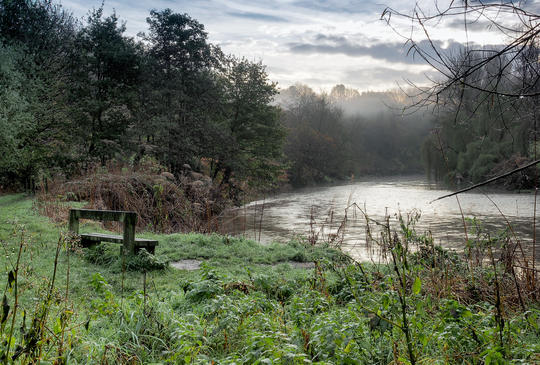
Could otters be returning to Greater Manchester?
Greater Manchester has struggled to re-establish the otter due to higher than average habitat loss, pollution, and human population density leading to disturbance.
But recent anecdotal evidence suggests that otters have been spotted in Greater Manchester rivers and the Greater Manchester Local Records Centre is now urging people to record their sightings.
Recent major problems for otters have been habitat loss and pollution, but through Natural Course, an EU Life funded project in North West England, organisations have been working together to improve water quality, reduce diffuse pollution, remove man-made modifications in rivers, and make other improvements to the North West river environment which are contributing to the improved habitat for otter populations.

“For many years now there has been a slow trickle of one or two sightings every year or so across Greater Manchester, which are suspected to be otters passing through while looking for places to set up their territories," said Mike Beard, Natural Course Project Officer.
"Just recently however, there has been a spike in anecdotal reports of otters being seen. This is a huge step forward in our attempts to naturalise our rivers again, we are really excited about what this could mean for Greater Manchester’s river environment.”
The crash in UK otter numbers has been largely caused by the introduction of certain pesticides - which otters were susceptible to - because of their predatory nature, but as bans on these dangerous toxins have been introduced, they have begun to thrive again.
“We’re so thrilled that reports suggest the otters are back but now we need concrete evidence that our work on improving the rivers is having a tangible effect," added Mike Duddy, Projects Manager at Mersey Rivers Trust.
"We need people to send in their recorded sightings to Greater Manchester’s Local Record Centre without doing anything that might disturb the otters as they establish a natural habitat.”
All otter sightings can be reported here.
“With real information and sightings, the team can then compile all otter records to draw a clearer picture of the status of the otter in our region, helping the authorities to determine what can be done to help the otters become re-established and to prevent further harm,” said Derek Richardson, Principal Ecologist at Greater Manchester Ecology Unit.
For more info visit the Natural Course website or contact Jayne Mann, Communications Executive for The Rivers Trust and Natural Course project at jayne.mann@theriverstrust.org or tel: 07943884874
Please Note:
Due to their decline in the UK and the rest of Europe, otters are a European protected species and are also fully protected by the Wildlife and Countryside Act 1981, the Conservation of Habitats and Species Regulations 2010, and the Conservation of Habitats and Species Regulations 2017.
Essentially, you're breaking the law if you: capture, kill, disturb or injure otters (on purpose or by not taking enough care). Their resting places are also protected and are especially sensitive to disturbance, so it is essential that people do not poke around or loiter if they think that they have found one.
Volunteers and organisations come together for 24 hour wildlife survey
Contributed by Mike Beard



